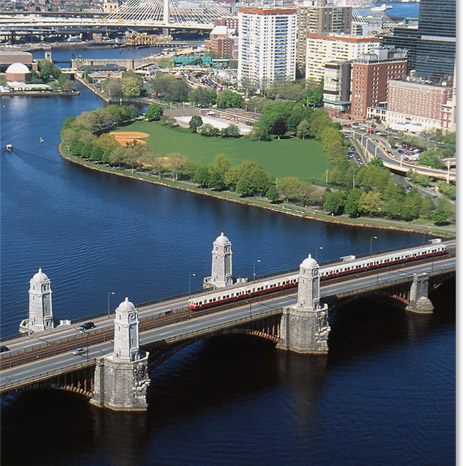Co-author of Landmark Longfellow Bridge Study Optimistic about State Infrastructure Maintenance Investments
BOSTON – Reconstruction of the Longfellow Bridge is now complete, and the co-author of a landmark study about the Longfellow’s restoration sees reasons to be optimistic that the Commonwealth is becoming more responsible about maintaining its infrastructure assets, according to a new Policy Brief published by Pioneer Institute.
“The Longfellow Bridge was like a family pet who had been left out in the cold overnight,” said Dr. Dave Westerling, author of “Looking Back at Longfellow Bridge.” “Thankfully, the experience seems to have sparked awareness of just what a bad idea that is.”
In “Our Legacy of Neglect: The Longfellow Bridge and the Cost of Deferred Maintenance,” published in 2007 on the 100th anniversary of the bridge’s opening, Dr. Westerling and former Pioneer Research Director Steve Poftak found that the combined cost of all maintenance to the bridge over the previous century and including the recent renovation, would have been about $143 million had 1 percent of the bridge’s capital cost been invested annually in a maintenance program. The final cost of the overhaul was $305.5 million.
But since that time, Dr. Westerling finds that great strides have been made. He points to repair and replacement of the Commonwealth’s courthouses, renovations to state college and university facilities, and the Massachusetts State Library Construction Program, which has helped build 54 new library buildings and 169 addition, renovation and conversion projects.
Dr. Westerling says future upgrades should include subways, commuter rail and electrification of the system to ensure the use of new energy sources such as wind and solar to move people quickly and quietly without increasing our carbon footprint.
About the Author
Dr. Dave Westerling is Professor Emeritus in the Department of Civil Engineering at Merrimack College. He is a Past President of the Boston Society of Civil Engineers/ASCE and a former Congressional Fellow in the U.S. Senate. Recently Dr. Westerling was Interim Inspector General for the City of New Orleans after Hurricane Katrina and last year he assisted FEMA and municipal utilities in Southeast Texas after Hurricane Harvey. He currently serves as Chairman of the Capital Planning Committee in the Town of Berlin, MA.
About Pioneer
Pioneer Institute is an independent, non-partisan, privately funded research organization that seeks to improve the quality of life in Massachusetts through civic discourse and intellectually rigorous, data-driven public policy solutions based on free market principles, individual liberty and responsibility, and the ideal of effective, limited and accountable government.



